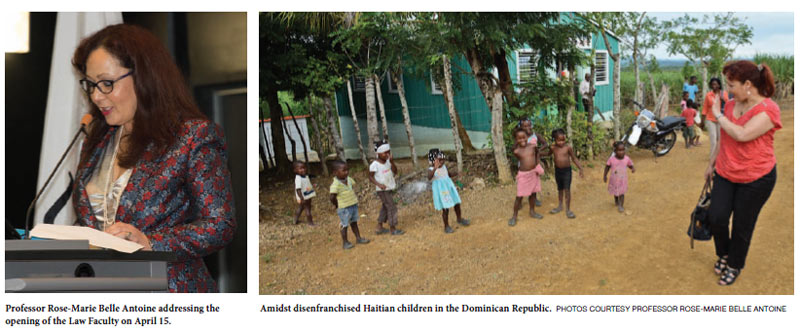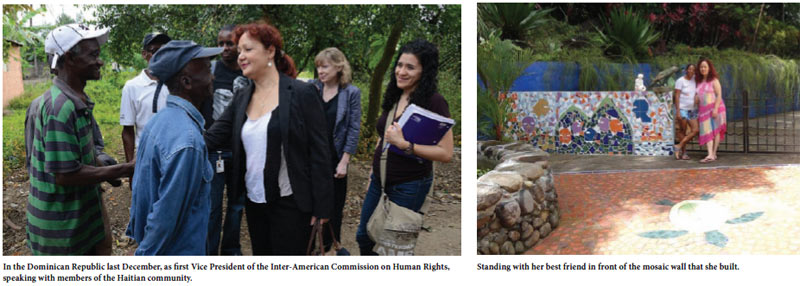 |
 |
 |
|
April 2014
|
Rose-Marie Belle Antoine, the new Dean of the new faculty, she’s as lively as early afternoon. Her eyes are expressive, and it’s fascinating to watch her thoughts play across them as she responds to my questions. “I’m a Caribbean woman,” she says when asked how she feels about regional identity. It’s as clear a rebuttal as any to V.S. Naipaul’s concept of the mimic men—a post-colonial Caribbean made of fragile pretenders stagnating in false societies. When Professor Antoine proclaims her Caribbean identity she does it with a self-assuredness that would be incomprehensible to Ralph Singh. Her confidence is well-founded. Through her diverse and prolific academic career she has created a place for herself, The UWI and the region, based on groundbreaking intellectual inquiry and dedication to social justice. To her, Caribbean means creative energy used for a positive purpose. It’s the outlook through which she will shape UWI St Augustine’s Faculty of Law over the next four years: “I don’t want to be a copy cat. I want to be the international authority. In the same way, the faculty has to be creative and relevant (in its courses and research). That’s how I see my academic work and the work of the faculty. We will do all the traditional things but we also have to be out there breaking new ground.” Law at St Augustine On April 15, UWI St Augustine officially launched its Faculty of Law in a campus ceremony that included Prime Minister of Trinidad and Tobago, Kamla Persad-Bissessar and Sir Charles Michael Dennis Byron, President of the Caribbean Court of Justice. This means students can now complete all three years of the Bachelor of Laws degree programme at St Augustine. Previously, they had to do their second and final year of the programme at the Cave Hill Campus in Barbados. It was an enormous undertaking and crucial to its success was finding the right person to head the faculty. There were several strong candidates but in the end the position went to Professor Antoine. Few would argue with the selection. Her credentials are outstanding. She holds a Chair as Professor of Labour Law and Offshore Financial Law. Previously, at the Cave Hill campus, she was the Deputy Dean and Director of the LLM programme. Professor Antoine is a winner of several regional and international awards, including the Vice-Chancellor’s Award for Excellence. In 2006 she won the Vice-Chancellor’s Award for Research and in 2013 for Public Service, making her the first two-time winner in the history of the awards. True to her word, she has built an international reputation for innovative research and is considered by many the foremost regional expert and thought leader in areas like offshore financial law, labour law and the law on HIV. That reputation extends as well to her published work. Professor Antoine is an award-winning author of 12 books and numerous articles, whose work is on the curriculum of universities in Africa, the US, the UK and continental Europe. But if there is any area of her work that she is most proud of, it is in the sphere of public advocacy: “I’m always surprised when people talk about my accomplishments. They are not that big a deal to me. I do get a feeling of quiet satisfaction when I see that my work influences policy. The other day one of my former students who is now a director at the HIV Unit in Caricom told me I was a change agent because of how influential my work has been in HIV.” She smiles. “I’ve lived to see labour law work I did in 1992 taken up by governments in the region. When I see equal opportunity legislation in Trinidad and Tobago I know that I wrote the early proposals. You talk about things for years and years and you think no one is listening and then one day, people do it. As an academic that is a very powerful thing.”\
Protest professor On March 21, 2001, Professor Antoine gave an intense example of her commitment to social justice when along with nine of her students she was arrested at a Cave Hill Campus protest. “I’ll never forget the date,” she laughs. “I was moving and my car was piled up with things when I saw my students protesting at the campus.” The law students were concerned about campus security. They had already had an altercation with the police and asked their lecturer to join them. So she did, not as a protestor but as a sign of solidarity. When the police returned, her youthful appearance worked against her. Thinking she was a student, she was manhandled and arrested with the others. “They came straight at me,” she said. “I was dragged—not very elegantly—to the police station.” A case of mistaken identity is easily corrected; but even after being given the opportunity to leave, Professor Antoine stayed with her students, subjecting herself to arrest and fingerprinting. “It was a very serious thing. A couple of my students couldn’t get visas. One couldn’t get a job. I am still fighting this battle for some of my students because they were supposed to have their records expunged and they never were,” she said. Fighting for others—students, women, children, the working class, the HIV positive—is part of her nature, embedded early in life through her parents. “I thought it was natural to stay,” she shrugged. “I could not leave. I grew up in that sort of family. You would do your duty. You would serve your community.” Professor Antoine is the seventh of eight children born to a French father and Grenadian mother. She grew up in Arima with her siblings (particularly her two sisters) as her friends and playmates. One of those sisters would become a nun and today is the Head of the Dominican Convent. “We had a very atypical childhood. We didn’t fit into any sort of social circle.” Today she lives in both Trinidad and St Lucia, with a strong preference for nature. “I’m a Virgo,” she says in explanation of her love for the natural world. One of things she misses most when in Trinidad is her garden in St Lucia, which is also where she does much of her creative work outside of academic law. Even without her long list of achievements in research and advocacy, Professor Antoine’s massive garden mosaic is proof of her superhuman creative energy. She’s also a vocal soloist. But apart from her family circumstance, her childhood was unique as well because of her birth. Professor Antoine was one of the first of Trinidad and Tobago’s “Independence babies.” This, she reasons, is why independence—of spirit and from colonial influence—is so important to her. “I’ve always defined myself by my independence. I am extremely independent. I am very outspoken. I’ve never had a crisis of confidence—even as a woman. Even before I went to Cambridge (for her LLM) and Oxford (for her PhD) I didn’t think they were any better than me. And when I got there I realised they weren’t. I sat with the supposed best in the world and yes they were very bright people, but honestly I thought my brother was brighter. I think my husband is brighter.”
She added, “a lot of people I meet in the Caribbean, even though they might not have had the same opportunities, have bright and logical minds. I have students like that as well. They may be grassroots but their minds are powerful.” With these twin fixations—intellectual independence and social responsibility—it’s easy to predict Professor Antoine’s vision for the new Faculty of Law at St Augustine. “I intend, of course, to make this the best faculty ever,” she laughs, but she’s not joking. “I also believe very strongly in developing people.” Key to this objective is encouraging her staff to engage in new research. To facilitate, her first priority is the establishment of a research fund. The often overworked and under-resourced academic staff have little time to devote to research, she says, especially in comparison to faculty in the US and Europe. Professor Antoine also sees her own publishing success as a motivator: “If they are working with someone who has published then they see that as the standard. This is the culture I’m seeing developing. They all want to publish. I have to say I am very inspired by my staff so far.” Her other objective is to make the Faculty of Law an engaging voice in the public discourse on topical social issues. “I feel very strongly that the faculty should be community oriented,” she said. “Lawyers are very insular. I have always been multi-disciplinary in my approach so it is something I want to push my colleagues to become involved in. We have a duty to be relevant to the society.” Her agenda is ambitious—like everything else she’s undertaken and succeeded at in her academic career. “We need to dream bigger,” she says, and there are few who live so in line with the maxim of big dreams. That’s why, apart from the particulars of her agenda for the Faculty of Law, the assets she brings are her inexhaustible creative impulse and the confidence to release it upon the world. If she can impart that—to the faculty, to the students, and to the legal fraternity—we will, like Professor Antoine, become pioneers. |

 It’s late evening and the campus is quiet, but Professor Antoine is surprisingly energised for her interview. Surprising, because it’s the tail end of a Thursday with lots to do since her return from an arduous stint at the Inter-American Commission on Human Rights in Washington and she is finishing preparation for the launch of the Faculty of Law at UWI St Augustine. This evening hour was the only time she had.
It’s late evening and the campus is quiet, but Professor Antoine is surprisingly energised for her interview. Surprising, because it’s the tail end of a Thursday with lots to do since her return from an arduous stint at the Inter-American Commission on Human Rights in Washington and she is finishing preparation for the launch of the Faculty of Law at UWI St Augustine. This evening hour was the only time she had.
